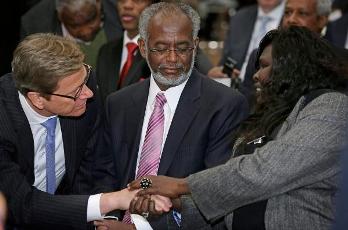Germany says goal of Sudan conference is to support north-south peace process
January 29, 2013 (WASHINGTON) – The German government has defended its decision to host an economic conference in Berlin on Sudan, with South Sudan saying that its goal is to encourage dialogue between the two ex-foes.
 The one-day gathering is sponsored by the Arab-German Chamber of Commerce and Industry, as well as the German-African Business Association and took place at the German Federal Foreign Office.
The one-day gathering is sponsored by the Arab-German Chamber of Commerce and Industry, as well as the German-African Business Association and took place at the German Federal Foreign Office.
Sudan was represented at the forum by its foreign minister Ali Karti, while South Sudan’s delegation was headed by its ambassador in Berlin Sitona Abdalla Osman.
The economic forum is seen as an opportunity for Khartoum to attract European companies to work in the country which is still reeling under a severe economic crisis that resulted following the secession of the oil-rich South in July 2011. Most Western companies shun the country due to a US trade embargo.
Germany had originally planned the forum for last October but shelved it after thousands of people stormed and set ablaze its embassy in protest against an anti-Islamic film. Sudan’s subsequent apology to Germany prompted the latter to reschedule it.
The foreign ministry in Berlin said that delegations from Juba and Khartoum will present their plans and ideas in the areas of construction, infrastructure, transport, mining, energy and water, health and education, agriculture and the food industry.
However, Germany’s hosting of the conference drew sharp criticism by some Sudanese opposition groups and activists who urged Berlin to scrap the event over what they described as a poor human rights situation in the country and restrictions imposed by Khartoum on humanitarian access to the rebel-held areas in the border states of South Kordofan and Blue Nile.
Last week the secretary-general of the Sudan People Liberation Movement North (SPLM-N), Yasser Arman, urged Germany not to host the conference and expressed fear that Khartoum would use any funds resulting from it to continue its war on the citizens of the Blue Nile and Nuba Mountains.
The SPLM-N took up arms against the Sudanese government in the weeks before South Sudan made its formal break from the north in July 2011.
More than 220,000 people have since fled into South Sudan and Ethiopia from the two states and the Sudanese government has refused to allow the United Nations access to rebel-held zones in both states.
The UN says about 700,000 people in Blue Nile and South Kordofan face critical food shortages.
Dozens of people staged a demonstration in front of the foreign ministry in Berlin to protest the conference and held signs blasting Khartoum over alleged human rights violations.
But the Sudanese ambassador in Berlin, Bahaa Al-Deen Hanafi, downplayed the protest saying it did not exceed more than 20 people, adding that the German foreign ministry had already notified the embassy in advance.
Hanafi said that the protestors were comprised mainly of “Nazis” that even Khartoum’s enemies did not join.
The low-level representation by South Sudan at the conference was attributed by some diplomatic sources to the negative publicity surrounding it. However, other sources in Juba denied this, saying the absence of South Sudan’s foreign minister, Nhial Deng Nhial, was due to personal reasons. They also noted that Nhial was not present at the recent round of talks in Addis Ababa between Khartoum and Juba.
German foreign minister Guido Westerwelle stressed that the goal of the conference was to boost the peace process between Khartoum and Juba.
“Without economic development there is no security, and without security there is no economic development,” Westerwelle said.
The two Sudans are at loggerheads over the territory of Abyei, which was left undecided when they split. They are also in a dispute over revenues from oil that comes mainly from the South but is transported through Sudan.
“In addition to the political dialogue, economic progress is crucial because peace has a lot to do with economic development … poverty and hardship are often the breeding ground for extremism,” he said.
In a meeting prior to the conference with his Sudanese counterpart, Westerwelle emphasised the importance of implementing the remaining items in the 2005 peace agreement with South Sudan. He also urged Khartoum to demonstrate its respect for human rights and fundamental freedoms.
The top German diplomat said that his country will continue to support the peace process but stressed that Juba and Khartoum must cooperate by allowing the resumption of cross-border trade and transportation.
“Cooperation is not always easy but is more productive than confrontation,” Westerwelle said.
Karti on his end reiterated Sudan’s commitment to fully implement the agreements signed with South Sudan, particularly ones related to security and others that pave the way for promoting peace and stability in the two countries.
He praised Germany for hosting the conference, pointing out that it would boost bilateral economic ties between the two sides and also called for the strengthening of cultural relations between the two countries.
The Sudanese official underscored that the investment environment in Sudan has become more attractive in light of the guarantees offered to companies investing in Sudan.
Sudan’s deputy ambassador to Germany, Khaled Moussa, said that the conference comes within the framework of Germany’s keenness to explore the potential investment opportunities in Sudan.
(ST)
